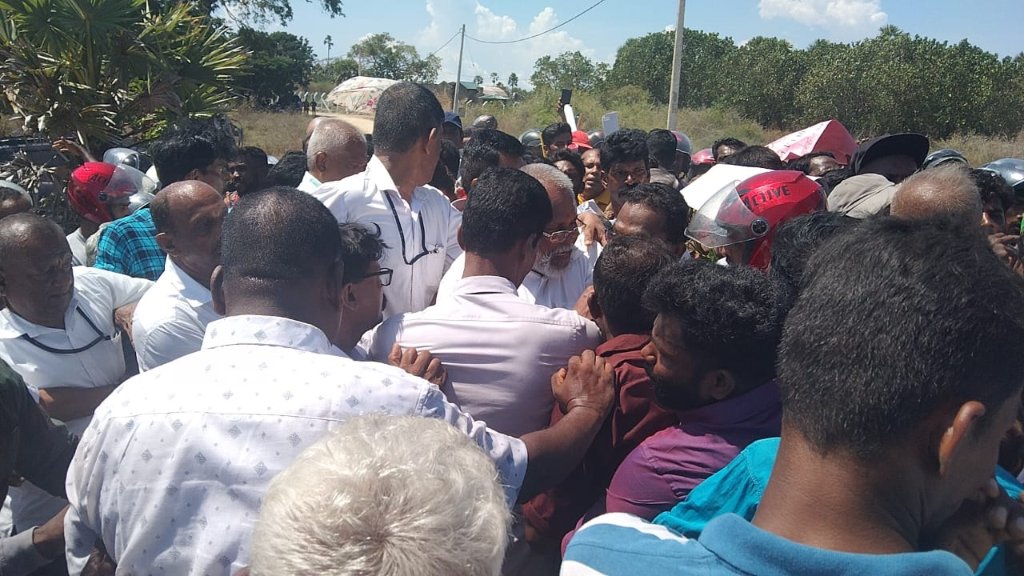(Image courtesy: Parthiban Shanmuganathan)
Sri Lanka’s Minister of Fisheries and government-aligned paramilitary leader Douglas Devananda was forced to flee on a motorcycle, after he was confronted by protestors in Kilinochchi last week.
Devananda, who heads the Eelam People’s Democratic Party (EPDP), attempted to demarcate land in Poonaveli in Kilinochchi for the construction of a cement factory that has been opposed by local residents in the region.
Tamils in Kilinochchi had been protesting for months alleging that the construction would pollute the water and exacerbate the existing scarcity of drinking water in the district. They also claimed that the discharge from the factory would render their pasture lands infertile for agricultural purposes.
Devananda was accompanied by officials from Sri Lanka’s survey department who were present to survey plots of land that would be demarcated for the construction of the cement factory by Tokyo Cement.
However, no sooner had Devananda alighted from his vehicle, that protestors holding slogans confronted him demanding that he abort the transfer of lands and surveying of the same. Devananda can be seen in several videos captured by reporters and onlookers unable to walk towards the proposed site as his path was blocked off by protestors. Despite the heavy Sri Lankan police presence, protestors managed to force the minister and his security detail to retreat to their vehicle.
Protestors can be heard jeering and clapping as Devananda was forced to flee on a motorcycle.
LEAD - Tamil protestors force paramilitary leader to flee on motorbike
— Tamil Guardian (@TamilGuardian) April 8, 2024
Sri Lanka’s Minister of Fisheries and government-aligned paramilitary leader Douglas Devananda was forced to flee on a motorcycle, after he was confronted by protestors in Kilinochchi last week.… pic.twitter.com/yLdkVxqhyU
The protest was staged by the ‘all peoples union Kiranchi Poonaveli Village Service Division', calling on the government to refrain from exploiting rural resources that will severely and directly impact the livelihood of people in the district. As part of the construction of the factory, plans are afoot to also drill underground boreholes which the villagers say will cause widespread environmental impact.
#SriLanka Minister Douglas Devananda going to open Tokyo Cement factory in Ponnavely, #Kilinochchi was forced to turn back by #Tamils protesting the harm to environment & livelihoods.
— LankaFiles (@lankafiles) April 5, 2024
In '23 Tokyo Cement Group won gold for ‘exceptional environmental conscious business practices’ pic.twitter.com/AbWOCgxeiE
With the concurrent extraction of limestone from the area by the cement factory that is expected to be built, concerns have mounted that the little remaining water accessible to the villagers may become increasingly saline, potentially rendering it brackish and undrinkable. The protestors have also aired their grievances to officials, including Devananda, who holds the Kilinochchi development portfolio, and other government representatives, but they said they had not received a response nor was there any action taken to address their demands.
The Geological Survey and Mines Bureau (GSMB) extended the exploration license of the private company, allowing them to hold around 12 square kilometres of land over the last decade by paying a nominal fee of Rs 2,000 per square kilometre. The company has been requesting mining rights as their exploration concluded in July 2023. All these years, they have been extending their license of exploration.
Devananda heads the notorious EPDP, a paramilitary organisation that continues to remain close to the Sri Lankan regime. Devananda, was elected to Parliament in 1994 and aligned with the government as it battled against the Liberation Tigers of Tamil Eelam (LTTE) and launched multiple military offensives. He has been rewarded with several ministerial posts throughout the years, including Minister of Social Services and Social Welfare, Minister of Agriculture, Marketing Development, Hindu Education Affairs and currently remains the Minister of fisheries.
Throughout the armed conflict the EPDP was armed and backed by the Sri Lankan state, carrying out a series of war crimes and other human rights violations. The EPDP was one of several paramilitary groups, including the Karuna faction, which was utilised by the Sri Lankan government.

